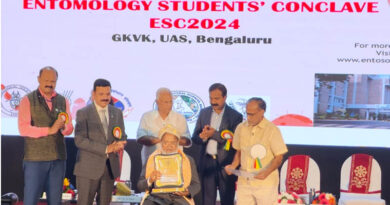Reduce Sugar production and increase conversion to ethanol: Gadkari
21 March 2022, New Delhi: Union minister for road transport and highways, Nitin Gadkari has called sugar factories to make a shift to conversion of sugar into ethanol, in line with the realities of changing times and the needs of the nation.
The minister issued a warning to leaders of sugar and allied industries that if sugar production goes ahead as it does now, it will be harmful to the industry in times to come. Reminding them that as a country, we are rice-surplus, corn-surplus and sugar-surplus, Gadkari said that what is good for our future is to reduce production of sugar and increase production of ethanol.
The minister was addressing the Sugar & Ethanol India Conference (SEIC) 2022 in Mumbai on Sunday. The conclave, organized by ChiniMandi, news and information portal for the sugar and allied industries, sought to bring together domestic & global industry experts to discuss the top challenges and risk response strategies in domestic and global sugar trade and the way forward to building a more innovative and sustainable Sugar & Ethanol sector in India.
Gadkari said the economics of ethanol is superior to that of vehicles run by diesel or petrol. “We have issued an advisory on flex engines; Toyota, Hyundai and Suzuki have assured me that they will bring flex engines within six months. Recently, we launched a pilot car run by green hydrogen. Toyota chairman informed me that their car is flex – either 100% petrol or 100% ethanol and that Toyota cars of coming days will be run on hybrid electricity, which will generate 40% electricity and run 60% of the distance using 100% ethanol. This economics will be highly advantageous in comparison to petrol.”
The minister informed that the centre has decided to open biofuel outlets for citizens to fill ethanol and that cars, scooters, motor cycles and rickshaws can be available on flex engine. “Prime Minister has inaugurated three ethanol pumps in Pune; however, no one has come so far to fill ethanol. This is because Bajaj, TVS and Hero have launched motor cycles driven by flex engine; scooters and motor cycles are available on flex engines. They are ready to come up with auto rickshaws as well.”
The minister exhorted all sugar factories who manufacture ethanol to open ethanol pumps in their factories and other areas. “This can bring in 100% ethanol-run scooters, auto rickshaws and cars and thus increase ethanol consumption, reduce pollution, bring down imports and also provide jobs to people in villages.” “There will definitely be a big enough market for Ethanol,” he said.
The minister assured that no one needs to be concerned whether there would be a big enough market for ethanol. “Ethanol is a green and clean fuel; we are producing 465 crore litres of ethanol at present. However, when E-20 programme gets completed, our requirement will become around 1,500 crore litres. Moreover, in coming five years, when flex engines get ready, ethanol requirement will become 4,000 crore litres.”
Hence, if you do not convert to ethanol and keep producing sugar, the factory will become loss-making, cautioned the minister.
A viable alternative is to produce syrup from sugarcane juice and produce ethanol from that as well, he added.
The minister said that every factory should go into B molasses. “India has promised that we will stop sugar export subsidy after December 2023. Hence, every factory should go into B molasses. Only if we discourage sugar production will we be able to get reasonable price for sugar. The government had reserved 245 crore litres for B molasses; however, only 55 crore litres or 22% has been supplied, which indicates a significant gap. Hence, this is a safe way by which sugar factories can also be saved and our economics will also be favourable due to ethanol.” He added that sea-heavy molasses should be discouraged and that the industry should think of producing ethanol from broken rice as well.
Using flex engines in road construction equipment is another way to promote ethanol, the Minister informed. “There has been an 80% rise in manufacturing of road construction equipment machinery; I have told them to stop using diesel engines and convert to flex engines, so that ethanol use can be promoted.”
The minister added that biodegradable plastic too has been made from ethanol by Brazil, something which can be replicated in India as well.
The minister said that the government is thinking of ways to increase use of ethanol in aviation sector and in the Indian Air Force. “I am also exploring how to use ethanol in aviation industry. Two years ago, fighter jets which participated in Republic Day Parade had used 100% bio-ethanol. I am in discussion with Air Force chief and defence ministry officials; we are thinking on how to increase use of ethanol in aviation and Indian Air Force.” We can also consider using ethanol in four lakh telecom mobile towers, the minister added.
The minister emphasized that there is no remedy for the sugar industry in India other than to reduce sugar consumption and increasing conversion of sugar to ethanol. We have to progress towards this at a fast pace, he said.
We need to move towards green revolution, for which we need to increase production of ethanol, said the minister. “Total petroleum imports in our country is at present ₹8 trillion, which is expected to become ₹25 trillion in next 5 years. Now, importing ₹25 trillion of petroleum products will create an economic difficulty. Moreover, new problems will arise due to influx of fossil fuels at such a high magnitude.” The minister hence pitched for use of ethanol and green fuels, citing the need to adopt import-substituting, cost-effective, pollution-free and indigenous solutions.
The minister underlined in no uncertain terms the urgent need for a shift to green fuels and for agriculture to diversify into energy and power sector. He also stated that LNG is the future fuel for the sector and for the country and the economics of LNG is so good as it is easy to convert biomass into bio-CNG and bio-LNG.















